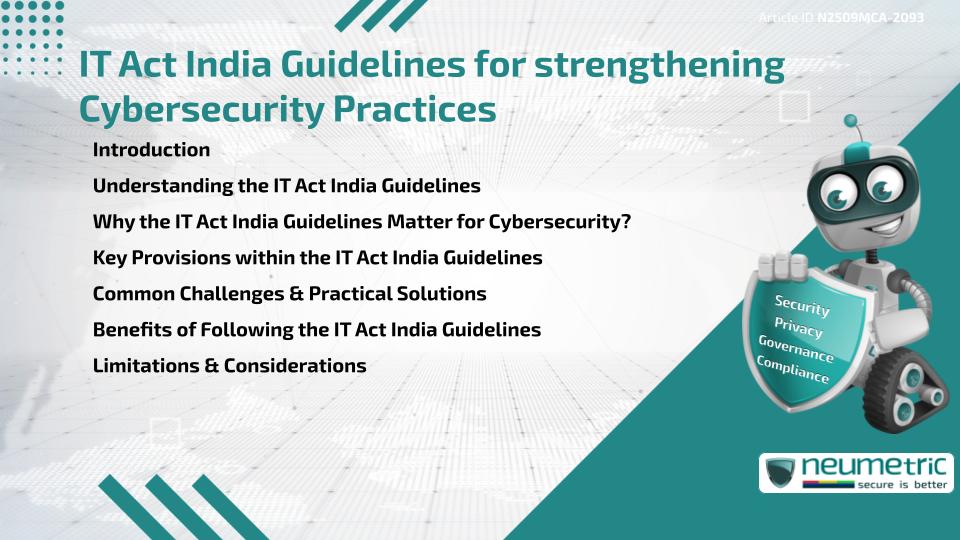Table of Contents
ToggleIntroduction
The IT Act India guidelines provide a Legal & Regulatory foundation for managing CyberSecurity Risks & Digital Operations in India. Established under the Information Technology Act, 2000 & strengthened through amendments & supporting rules, these guidelines aim to ensure the Security of Electronic Transactions, protect Sensitive Information & Combat Cybercrime. This Article outlines the importance, key provisions, challenges & benefits of adopting the guidelines for robust CyberSecurity Practices.
Understanding the IT Act India Guidelines
The Information Technology Act, 2000 (commonly known as the IT Act) is India’s Primary Legislation governing Digital activities. The IT Act India guidelines translate the Act’s provisions into Practical obligations for Organisations & Individuals.
They cover areas such as Electronic Governance, Data Protection, Intermediary Liability & Penalties for Cyber offences. For official reference, see the Ministry of Electronics & IT.
Why the IT Act India Guidelines Matter for CyberSecurity?
India’s rapid Digital growth has expanded both Opportunities & Risks. Cybercrime, Data Breaches & Misuse of Digital Platforms pose significant Threats. The IT Act India guidelines are critical because they:
- Provide Legal recognition for Electronic Records & Digital Signatures.
- Define responsibilities for protecting Sensitive Personal Data.
- Establish penalties for Cybercrimes like Hacking, Identity Theft & Fraud.
- Clarify the Liability of Intermediaries such as Service Providers.
- Enhance trust in India’s Digital Economy.
The NASSCOM Data Security resources highlight the importance of strong Compliance for Enterprises in India.
Key Provisions within the IT Act India Guidelines
- Data Protection Obligations – Organisations must adopt reasonable Security Practices to protect Sensitive Information.
- Cybercrime Penalties – Offences such as Hacking, Phishing & Identity Theft are punishable under the Act.
- Electronic Governance – Recognises Electronic Signatures & Digital Contracts as Legally valid.
- Intermediary Liability – Service providers must act responsibly in removing unlawful content when notified.
- Grievance Redressal – Enterprises must appoint Officers to address Data & Privacy concerns.
- Incident Reporting – Certain Cyber Incidents must be reported to the Authorities promptly.
For global context, see the OECD Digital Security principles.
Common Challenges & Practical Solutions
- Awareness Gaps – Train Employees regularly on IT Act obligations.
- Vendor & Third Party Risks – Extend Compliance checks to partners managing Data.
- Evolving Threat Landscape – Adopt Continuous Monitoring & adaptive Risk Management.
- Resource Constraints – Use Compliance Software to streamline monitoring & reporting.
The NCSC UK Risk Management collection provides useful Practices for addressing such challenges.
Benefits of Following the IT Act India Guidelines
- Legal Protection – Ensures Compliance & Reduces exposure to Penalties.
- Stronger Security Posture – Supports proactive Defence against Cyber Threats.
- Business Trust – Builds Credibility with Customers, Partners & Regulators.
- Operational Efficiency – Aligns processes with recognised CyberSecurity Standards.
Limitations & Considerations
The IT Act India guidelines form the baseline for CyberSecurity but are less comprehensive than International Frameworks like GDPR or NIST Standards. Enterprises should treat them as a foundation while integrating stronger Governance models to address modern Risks.
Takeaways
- The IT Act India guidelines set Legal Standards for CyberSecurity & Digital Governance.
- Key provisions include Data Protection, Intermediary Liability & Cybercrime Penalties.
- Compliance strengthens Trust, reduces Risks & Improves Operational Resilience.
FAQ
What are the IT Act India guidelines?
They are Regulatory provisions under the IT Act, 2000, governing CyberSecurity, Data Protection & Digital Operations in India.
Why are these Guidelines important?
They help safeguard Sensitive Data, reduce Cybercrime & ensure Accountability.
Who must Comply with them?
All organisations & intermediaries engaged in Digital activities in India.
Do the guidelines address Cybercrime?
Yes, they Define & Penalise Offences such as Hacking, Identity Theft & Online Fraud.
Are the guidelines sufficient on their own?
They provide a foundation but must be complemented with Advanced CyberSecurity Frameworks.
References
- Ministry of Electronics & IT – Government of India
- NASSCOM – Data Security Resources
- OECD – Digital Security Principles
- NCSC UK – Risk Management Collection
- IT Governance – CyberSecurity Resources
Need help for Security, Privacy, Governance & VAPT?
Neumetric provides organisations the necessary help to achieve their CyberSecurity, Compliance, Governance, Privacy, Certifications & Pentesting needs.
Organisations & Businesses, specifically those which provide SaaS & AI Solutions in the Fintech, BFSI & other regulated sectors, usually need a CyberSecurity Partner for meeting & maintaining the ongoing Security & Privacy needs & requirements of their Enterprise Clients & Privacy conscious Customers.
SOC 2, ISO 27001, ISO 42001, NIST, HIPAA, HECVAT, EU GDPR are some of the Frameworks that are served by Fusion – a SaaS, multimodular, multitenant, centralised, automated, CyberSecurity & Compliance Management system.
Neumetric also provides Expert Services for technical Security which covers VAPT for Web Applications, APIs, iOS & Android Mobile Apps, Security Testing for AWS & other Cloud Environments & Cloud Infrastructure & other similar scopes.
Reach out to us by Email or filling out the Contact Form…





